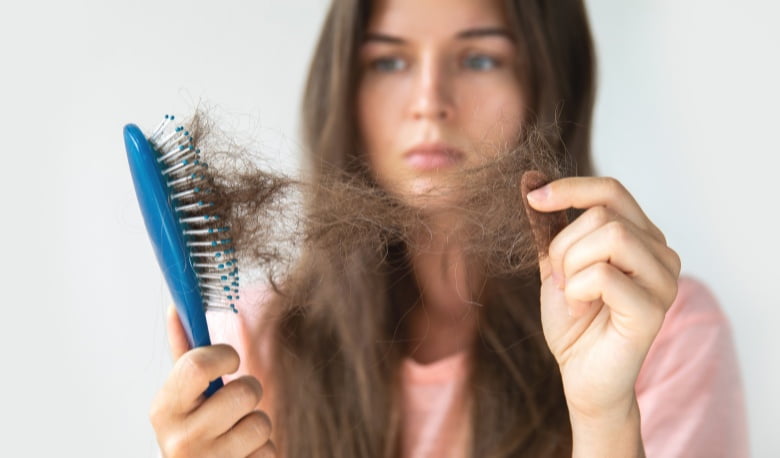Hair loss can be a frustrating and emotionally difficult experience for many. While reaching for that specialized hair loss shampoo seems like the immediate answer, the solution to healthier hair and potential hair regrowth may lie deeper than just your shower routine. Let’s dive into the lifestyle factors, supplements, and natural remedies that can play a vital role in supporting your hair’s health and potentially reducing noticeable hair loss.

Understanding Hair Loss: It’s Not Just About Your Shampoo
While genetics can definitely influence hair loss patterns, several other factors are deeply intertwined with hair health:
Stress: The Hair Follicle Foe
Stress, especially chronic stress, disrupts the normal hair growth cycle. It can force a higher percentage of hair follicles into a resting phase prematurely, leading to increased shedding. Additionally, elevated stress hormones can affect blood flow to the scalp, potentially hindering the delivery of vital nutrients to the hair follicles.
Nutrition & Deficiencies: Your Hair’s Food for Growth
Hair follicles are like tiny factories with high energy demands. Deficiencies in essential nutrients like iron, zinc, protein, and B vitamins can starve these factories, impacting hair production and hair strand strength. Iron deficiency is a notably common link to hair loss, especially in women.
Hormonal Imbalances: Disrupting the Hair Cycle
Hormones play a crucial role in regulating the hair growth cycle. Imbalances in hormones like those caused by thyroid disorders (hypothyroidism or hyperthyroidism), PCOS (Polycystic Ovary Syndrome), and menopause can lead to noticeable hair thinning or shedding. In these cases, addressing the underlying hormonal imbalance is essential for addressing hair loss.
Medical Conditions and Medications: Unexpected Side Effects
Several medical conditions like autoimmune diseases or scalp infections can lead to hair loss. Furthermore, certain medications used for cancer treatment, high blood pressure, depression, and others can list hair loss as a potential side effect. If you suspect a medication is contributing to hair loss, talk to your doctor about potential alternatives.
Scalp Health: The Foundation of Healthy Hair
An unhealthy scalp, one plagued by inflammation, excess oil, or dryness, creates a poor environment for hair growth. Conditions like dandruff, seborrheic dermatitis, or fungal infections can cause irritation, flaking, and impact the ability of hair follicles to thrive and produce healthy strands. Focusing on scalp health is a critical piece of the hair loss puzzle.

Lifestyle Shifts for Stronger Hair
- Stress Management is Key: Adopt relaxation techniques like yoga, meditation, or spending time in nature to combat stress. Prioritize good sleep hygiene as well.
- Nourish from Within: Focus on a well-rounded diet full of fruits, vegetables, lean protein, whole grains, and healthy fats. Pay special attention to iron, zinc, B vitamins, and vitamin D.
- Hydration Matters: As with the rest of your body, your hair needs adequate hydration. Water keeps your scalp healthy and aids in nutrient delivery to your follicles.
- Be Gentle: Avoid harsh hair treatments, tight hairstyles, and excessive heat styling which can physically damage hair.
Supplements with Potential Benefits
Before starting any supplementation, it’s crucial to consult your doctor as these may interfere with medication or exacerbate existing conditions. Supplements that may have some benefit for hair health include:
- Biotin (Vitamin B7): Helps with keratin production, essential for healthy hair.
- Iron: If you have iron deficiency anemia, addressing it can improve hair loss.
- Zinc: Plays a role in hair tissue growth and repair.
- Vitamin D: Emerging research suggests a link between low vitamin D and hair loss.
- Multivitamins Tailored for Hair Health: Look for those formulated for hair with a mix of the above nutrients plus others like Vitamin C.
Natural Remedies: Tradition Meets Research
While more studies are needed on many of these, some natural remedies show potential in hair loss support:

Scalp Massage with Essential Oils: Stimulation and Potential Benefits
Scalp massage itself increases blood flow to the area, promoting nutrient delivery and stimulating hair follicles. The addition of certain essential oils, particularly rosemary and peppermint, has shown some promise in hair growth studies. Rosemary oil is thought to have anti-inflammatory properties and may improve circulation, while peppermint oil creates a cooling sensation that can feel stimulating.

Aloe Vera: The Scalp Soother
Aloe vera is renowned for its soothing and healing properties. It can help calm itchy, irritated scalps, and reduce inflammation, potentially creating a healthier environment conducive to hair growth. Aloe vera’s moisturizing properties may benefit hair strands as well, making them less prone to breakage.

Onion Juice: The Surprising Remedy
While the pungent smell might be off-putting, onion juice boasts some surprising data in studies concerning patchy hair loss (alopecia areata). The idea is that sulfur compounds in onion juice may promote localized hair regrowth. While the exact mechanism is unclear, it is a traditional remedy with some science-backed interest.
Important Considerations
- Natural Doesn’t Mean Risk-Free: Even natural substances can have side effects. Always patch test and check with your doctor about potential interactions.
- Temper Expectations: These remedies take time and consistency, and results may vary significantly between individuals.
- Underlying Issues: If hair loss is sudden or severe, seek medical advice to rule out medical conditions that need treatment.
Finding the Right Path for You
The journey to healthier hair and addressing hair loss is often multifaceted. Experiment with the tips above and track your response. Don’t hesitate to seek professional guidance from a dermatologist or trichologist (hair specialist) for personalized recommendations.
Remember, while losing hair can be upsetting, your self-worth isn’t determined by the number of hairs on your head!




